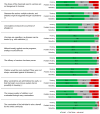Vaccine Attitudes, Knowledge, and Confidence Among Nursing, Pediatric Nursing, and Midwifery Undergraduate Students in Italy
- PMID: 40872900
- PMCID: PMC12390287
- DOI: 10.3390/vaccines13080813
Vaccine Attitudes, Knowledge, and Confidence Among Nursing, Pediatric Nursing, and Midwifery Undergraduate Students in Italy
Abstract
Background: Vaccine hesitancy (VH) represents a growing concern among healthcare professionals and students, potentially undermining public health efforts. Nursing, pediatric nursing, and midwifery students are future vaccinators and educators, making it essential to understand their attitudes, knowledge, and confidence toward vaccination. This study aims to assess vaccine-related perceptions and behaviors among these student populations in an Italian university.
Methods: A cross-sectional survey was conducted between November 2022 and February 2024 at the University of Rome "Tor Vergata". A structured, anonymous questionnaire, including the Vaccination Attitudes Examination (VAX) scale, vaccine knowledge items, and sources of information, was administered to students in nursing (n = 205), pediatric nursing (n = 46), and midwifery (n = 21). Statistical analyses included descriptive statistics, ANOVA, post hoc tests, and Mann-Whitney U tests.
Results: Among the 272 participants, 20.6% reported refusing at least one recommended vaccine, and 18.4% delayed vaccination for non-medical reasons. Vaccine knowledge and confidence increased significantly with academic progression (p < 0.001). Midwifery students showed both the highest concern for long-term vaccine effects and the greatest confidence in vaccine safety. Institutional and scientific sources were the most trusted, though traditional and non-institutional media also influenced perceptions, particularly among midwifery students.
Conclusions: Despite high COVID-19 vaccine uptake, VH persists among health professional students. Discipline-specific patterns highlight the need for early, targeted educational strategies to enhance vaccine literacy and reduce hesitancy. Tailored training may empower future professionals to become informed and credible advocates for vaccination.
Keywords: COVID-19 vaccination; health education; healthcare students; midwifery; nursing students; pediatric nursing; vaccine confidence; vaccine hesitancy; vaccine literacy.
Conflict of interest statement
The authors declare no conflicts of interest.
Figures
References
-
- World Health Organization Vaccines and Immunization. [(accessed on 15 April 2025)]. Available online: https://www.who.int/es/health-topics/vaccines-and-immunization#tab=tab_1.
-
- World Health Organization How Do Vaccines Work? [(accessed on 15 April 2025)]. Available online: https://www.who.int/es/news-room/feature-stories/detail/how-do-vaccines-....
-
- Picchio A., Garcia M., Sagué-Vilavella M., Rius C. Knowledge, attitudes and beliefs about vaccination in primary healthcare workers involved in the administration of systematic childhood vaccines, Barcelona, 2016/17. Eurosurveillance. 2019;24:1800117. doi: 10.2807/1560-7917.ES.2019.24.6.1800117. - DOI - PMC - PubMed
LinkOut - more resources
Full Text Sources



